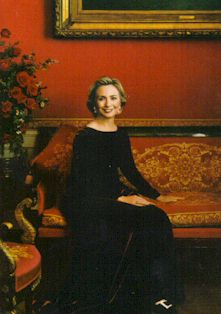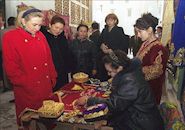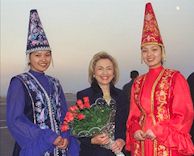 |

 |
|
By Jesse Monteagudo
 The only person to emerge with any dignity from the sorry mess of
"Monicagate" is First Lady Hillary Rodham Clinton.
The only person to emerge with any dignity from the sorry mess of
"Monicagate" is First Lady Hillary Rodham Clinton.
Some people sympathize with Mrs. Clinton as the "wronged wife" and the "victim" of her husband's infidelities, a label that she vehemently rejects. Many others admire her silent courage, her loyalty to her husband, and her willingness to face the "vast right-wing conspiracy" that seeks to destroy the two of them. As Bill Clinton was impeached by the House of Representatives his wife's ratings soared and her handsome face and figure graced the cover of Vogue magazine.
Hillary Rodham was born in Chicago on October 26, 1947, the eldest child and only daughter of Hugh E. Rodham and Dorothy Howell Rodham. Raised in the Chicago suburb of Park Ridge, Illinois, Hillary was an over-achiever both inside and outside the classroom. At first a political conservative, she turned against the Vietnam War while studying at Wellesley College. Graduating with high honors in 1969, she spoke at the commencement: "We are, all of us, exploring a world that none of us understands and attempting to create within that uncertainty. But there are some things we feel - we feel that our prevailing, acquisitive and competitive corporate life, including, tragically, the universities, is not the way of life for us. "We're searching for more immediate, ecstatic and penetrating modes of living. And so our questions, our questions about our institutions, about our colleges, about our churches, about our government continue. Every protest, every dissent, is unabashedly an attempt to forge an identity in this particular age. ... For too long, those who lead us have viewed politics as the art of the possible. The challenge that faces them - and us - now is to practice politics as the art of making possible what appears impossible." Rodham went on to Yale University Law School, where she met William Jefferson Clinton. While walking across the student lounge one day, she heard the tail end of a sentence spoken in a soon-to-be-familiar drawl: "...and not only that, we have the biggest watermelons in the world." It was Clinton bragging to a group of skeptical students about the (agricultural) allures of Arkansas.
 Bill and Hillary met later at the law library when
she, annoyed at the furtive glances they gave one another, stepped up to
introduce herself: "If you're going to keep looking at me, and I'm going to
keep looking back, we at least ought to know each other." The two began
dating, even when Clinton moved back to Arkansas.
Bill and Hillary met later at the law library when
she, annoyed at the furtive glances they gave one another, stepped up to
introduce herself: "If you're going to keep looking at me, and I'm going to
keep looking back, we at least ought to know each other." The two began
dating, even when Clinton moved back to Arkansas.
Hillary's lifelong involvement in children's rights goes back to her years at Yale. In 1972 she testified before a regional hearing of the Democratic National Convention Platform Committee in Boston, urging the party to extend civil and political rights to children. After graduation from law school in 1973, Rodham accepted a job with the Children's Defense Fund in Cambridge, Massachusetts. Hillary's pro-children's views were articulated in her groundbreaking article, "Children Under the Law," published by the Harvard Educational Review in 1973. In 1974. Hillary Rodham served as staff lawyer for the House Judiciary Committee during its consideration of impeachment charges against President Richard Nixon. Though she enjoyed the Capital's political whirl, her love for Bill Clinton drew her to Arkansas, where she taught law at the University of Arkansas in Fayetteville from 1974 to 1977. Rodham married Clinton on October 11, 1975 in Fayetteville, Arkansas. While her husband sought a career in politics, the new Mrs. Clinton --who continued to use her maiden name - joined the Rose Law Firm in Little Rock (1977), where she earned a six-figure income --making her the main breadwinner in her family. Hillary's legal and political careers flourished. In 1988 and 1998 the National Law Journal named her one of the "100 Most Influential Lawyers in America". In 1978 President Jimmy Carter appointed her chair of the Legal Services Corporation Board. But her insistence upon her own name and career were criticized by conservative Arkansans, especially after her husband was elected (1978) governor of the state. After Clinton lost his bid for re-election in 1980 his wife turned over a new leaf, adopted her husband's name, changed her hair color and replaced her glasses with contact lenses. The people of Arkansas, satisfied with the changes, re-elected Clinton in 1982. As First Lady of Arkansas, Hillary Clinton headed the standards committee that recommended procedures for implementing the state's education reform program. But the biggest crisis of her tenure in Little Rock occurred in 1992, after Governor Clinton announced his intention to run for president. When Gennifer Flowers revealed her 12-year affair with Clinton, his loyal wife defended him on "60 Minutes" (January 26, 1992):
 "I'm not sitting here because I'm some little woman standing
by my man, like Tammy Wynette. I'm sitting here because I love him and I
respect him and I honor what he's been through and what's we've been through
together, and you know, if that's not enough for people, then heck, don't
vote for him."
"I'm not sitting here because I'm some little woman standing
by my man, like Tammy Wynette. I'm sitting here because I love him and I
respect him and I honor what he's been through and what's we've been through
together, and you know, if that's not enough for people, then heck, don't
vote for him."
Though Ms. Wynette resented Ms. Clinton's critique of her signature song, most Americans were satisfied, and elected Bill Clinton President of the United States. Since they emerged in the public spotlight the American public- - pundits and common folk alike -- wonder about the Clinton marriage. Is it a marriage of love or a marriage of convenience? And why does Hillary put up with so much philandering on her husband's part? The fact that only one child - Chelsea - came out of the Clinton marriage suggests either a high degree of family planning or a low degree of intimacy. Perhaps, like many couples, the Clintons have an "understanding" to respect each other, support each other, and tolerate each other's sexual excursions. Certainly they realize that, without each other, they would never accomplish their political aims, or reach the White House. As First Lady, Hillary's first act was to announce that henceforth her name would be Hillary Rodham Clinton. She set a style for activism not seen in a First Lady since ER. She did not adopt Barbara Bush's "motherly" style, nor Nancy Reagan's behind-the-scenes Machiavellian gambits. As if to let the world know that she meant business, Mrs. Clinton occupied an office in the West Wing of the White House, where the president's senior staff members work. Soon the President appointed her to head his Task Force on National Health Reform, charged with overhauling the nation's health care system. Hillary Clinton's foray into reform politics was a disaster. The opposition of Republican politicians and the medical and insurance lobbies doomed health care reform, and led to the GOP takeover of Congress in 1994. Hillary's ratings plunged as she gained the reputation of a Lady Macbeth, both in public and in her dealings with the White House Staff. Conservatives who hated Bill Clinton loathed his outspoken wife, seeing her as the personification of all that's wrong with modern women, from her child-raising methods to her support for gay and abortion rights. Hillary pulled back. As in 1980, she adopted a more sedate image - lighting the White House Christmas tree and making cookies. However, her concern for women's and children's issues remained high. At the United Nations Fourth World Conference on Women in Beijing, China (Sept. 5, 1995), Mrs. Clinton spoke about the concerns of all women and the issues that they share:
 "However different we may be, there is far more that unites
us than divides us. We share a common future. And we are here to find
common ground so that we may help bring new dignity and respect to women and
girls all over the world - and in so doing, bring new strength and stability
to families as well.
"However different we may be, there is far more that unites
us than divides us. We share a common future. And we are here to find
common ground so that we may help bring new dignity and respect to women and
girls all over the world - and in so doing, bring new strength and stability
to families as well.
"By gathering in Beijing, we are focusing world attention on issues that matter most in the lives of women and their families: access to education, health care, jobs, and credit, the chance to enjoy basic legal and human rights and participate fully in the political life of their countries." As First Lady, Hillary Rodham Clinton traveled the globe, speaking forcefully on women's and children's rights. She spoke at the Rights of Women and Children within the Framework of Sustainable Human Development Conference in La Paz, Bolivia (December 3, 1996) and at Vital Voices: Women in Democracy forum in Vienna, Austria (July 14, 1997), where she urged female leaders in former communist countries to work hard for women's rights. She spoke on reproductive health and domestic violence in Buenos Aires, Argentina, Oct. 17, 1997, where she was greeted with applause and cheers by Argentine women. "Hillary is a radical feminist, and we welcome that here," said lawyer Liliana Tojo. Observing the 50th Anniversary of the United Nation's Declaration of Human Rights - the work of Eleanor Roosevelt - Mrs. Clinton spoke about the need to include women's rights among the basic human rights: "I believe - and the women I've listened to believe - that human rights are as essential to life as air or water. ... The women I have met do not feel human rights are a foreign concept invented by theorists. ... We do not believe that violence against women is simply cultural, we believe it is simply criminal. And perhaps that is why rape and sexual assault continue to be tactics of war. "In too many places, female heirs receive less inheritance than male heirs. Inequitable divorce laws compel women to remain in cruel marriages. And courts of law require the testimony of two women to equal that of an ordinary man. In some countries, only men enjoy the right to vote, and women are trafficked as domestic servants, sweatshop workers and prostitutes. Access by women to equal educational opportunities is limited, and illiteracy rates remain disproportionately high. The full protection of the rights of women is the unfinished business of this turbulent century." The First Lady articulated her views on childcare in the book It Takes a Village: And Other Lessons Children Teach Us (1996). It Takes a Village was a best seller and won Hillary a Grammy for the audio cassette version, but it was attacked by conservatives as an assault on the rights of parents and the "traditional family". "This is typical left wing pap," wrote one critic. "Mrs. C should have spent more time watching for the nocturnal habits of her sleeze [sic] of a husband and less time telling the rest of us how to raise our children. It's easy to ship them off to school like she did her own daughter," wrote another. On a less-exalted (and less controversial) level, Hillary followed that book with Dear Socks, Dear Buddy: Kids' Letters to the First Pets (1998), which also became a best seller. What will happen to Hillary Rodham Clinton after her husband's retirement or conviction is anyone's guess. Some say that she will divorce her husband. Others think that she will seek a political career of her own, perhaps run for the U.S. Senate from New York in the year 2000. Whatever she does, it is clear that Hillary Clinton will continue make an impact, cause controversy, and widen the horizons for women and girls the world over. |

© 1997-98 BEI